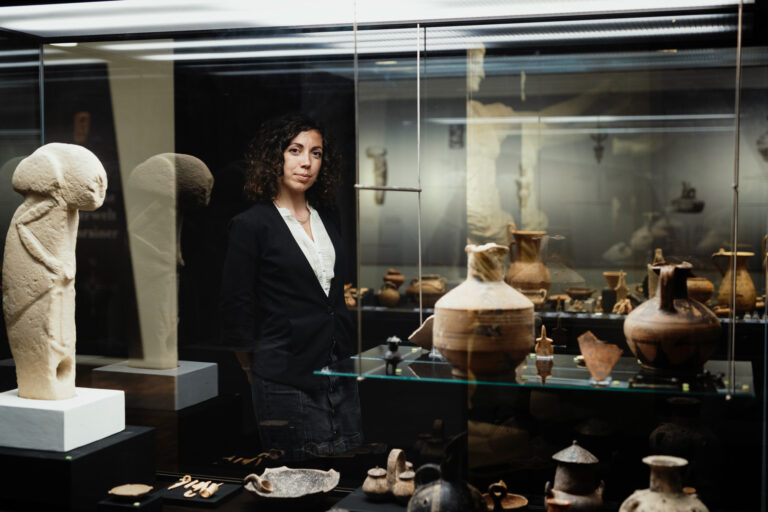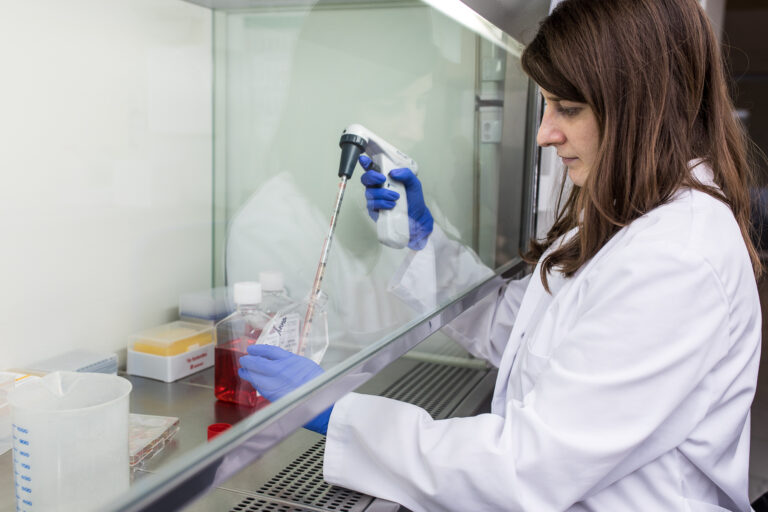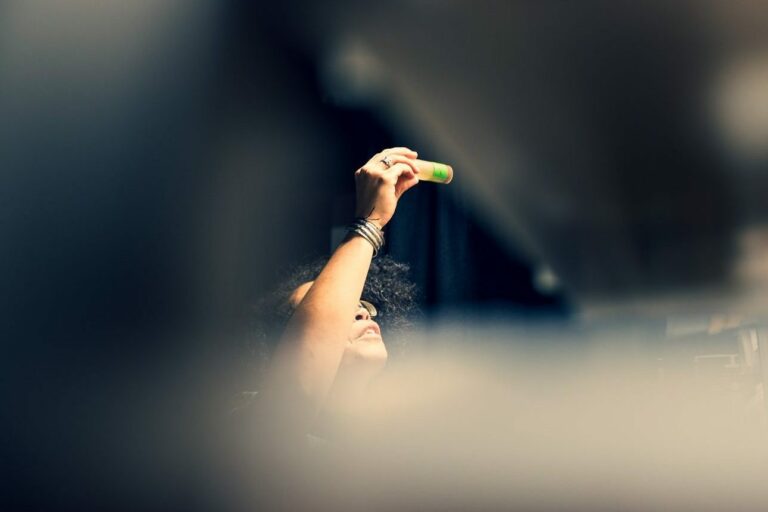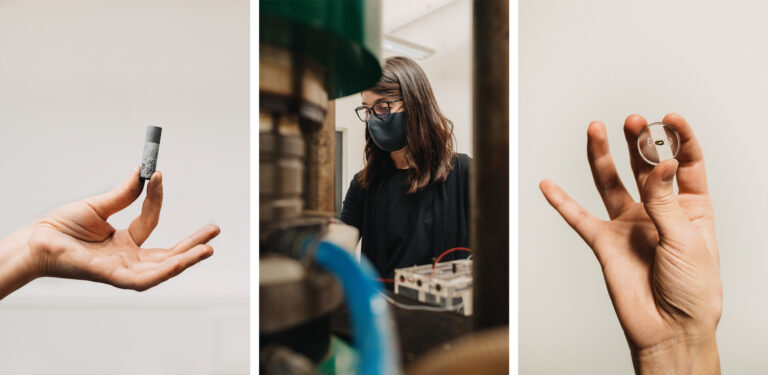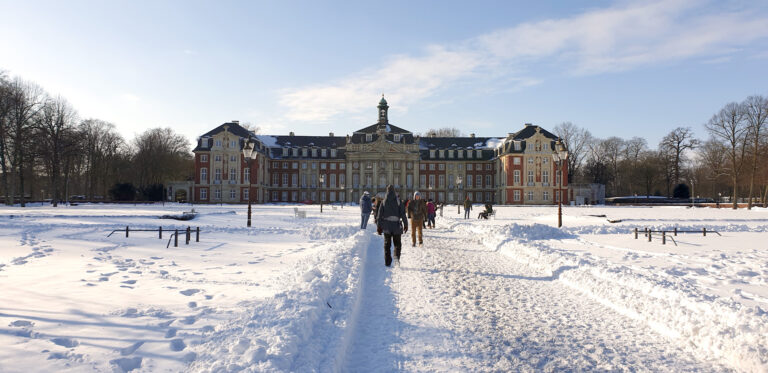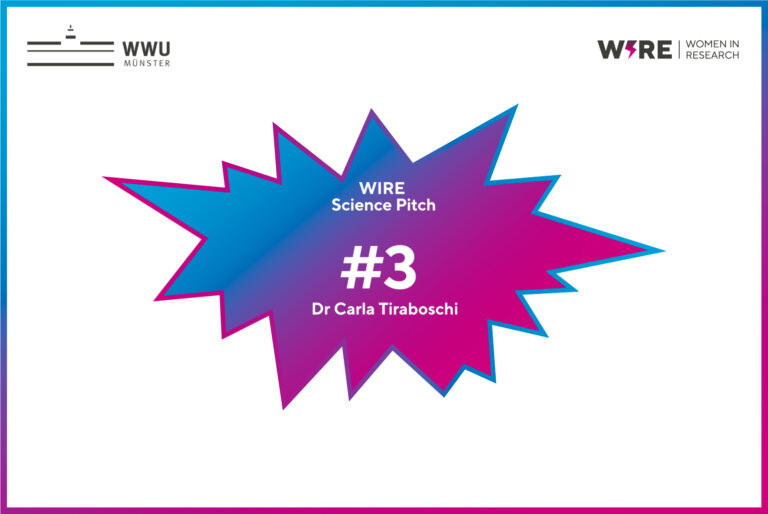
About Frogs, Superheroes and a Big Priority in World Health – an Interview with Dr. Arianna Parnigoni
In the series “33 questions” we introduce, in no particular order, our WiRe Fellows who are currently working on a research project here at the University of Münster. Why 33? Well, if we think of the rush hour of life, it is kind of the age that lies in its middle. And we also like the number😉.
In today’s episode we are speaking with Arianna, biologist working on cancer research.

1. What motivated you to work in the field of cancer research?
Cancer is a fascinating disease, complex and made of an intricate web of genetic and molecular interactions, many of which still need to be untangled and better (if not completely) understood. Moreover, cancer is a very translational field, offering the opportunity to interface with exciting and interesting questions, new practical techniques, and different research fields, which results in very challenging and stimulating work.
2. Describe your daily work in three words.
Hypothesis, experiments, statistics.
3. Describe your research topic in three words.
Breast cancer, hyaluronan, non-coding RNAs.
4. A good biologist needs…?
Good knowledge of molecular biology and, most importantly, be open-minded!
5. What is the best experience you have had as a scientist / researcher?
The best experience as a researcher is anytime I can fly to a new country, work in a new laboratory, and learn new things. I love to expand my knowledge.
6. Which (historical) important scientist would you like to have dinner with? What would you ask?
Rosalind Franklin: the real discoverer of the helix morphology of DNA. I would like to ask her how she managed to pursue a solid career in scientific research in a period when science was made mainly (if not only) by men.
7. If time and money were no object: Which research project would you like to do?
It would be wonderful to perform a huge screening on cancer patients worldwide, to find which are the actual markers that could help in the early diagnosis of tumours and to perform targeted therapy – a lot of tumours still lack such targeted therapy (some kinds of breast cancers are among those), drastically reducing the effectiveness of the treatment.
8. What is your favorite research discipline other than your own?
Ethology. I am a big lover of animals, and I’ve been always interested in understanding their behaviours. Indeed, my house has always been full of a lot of different (and sometimes quite unusual) animals. Are you familiar with sugar gliders? Those are among my favourite ones!



9. What do you consider the greatest achievement in the history of science / your field?
Hard to answer. Any discovery is essential in science, as it lays the foundation for future achievements. Having to choose one: the sequencing of the human genome. It unearthed many interesting details about our genome, dispelling many false myths (no, our genome is not as unique as we think, nor is it the most complex!)
10. Which experience in the world of science disappointed you most?
The covid-19 pandemic unveiled a lot of misinformation from numerous scientists, some even very prominent. This has contributed to worsening the situation, triggering a feeling of anger, insecurity and disbelief in the people not only towards the institutions but also towards most of the scientists, physicians and experts in the field. Normally, science should work like this: formulate a hypothesis, run your experiments, study a lot and only then confirm or even disprove your hypothesis. The pandemic has shown that unfortunately, the scientific method is not always applied thus leading to the spread of fake news and disinformation, which is really upsetting.
11. What was the funniest moment you had in science?
When you find your perfect labmate, lab life is always funny! I particularly remember once, when I needed to make injections to some Xenopus Laevix (which are African clawed frogs). These frogs were just impossible to block because they were very slimy and continued to slip away from my hands. I was trying the impossible, blocking the very last Xenopus, when my labmate just risked making the injection in my hand! That was scary at first moment, but after a few seconds, we started laughing a lot!

12. How did you survive your PhD time?
I did survive thanks to all the people that worked in the lab with me and made me laugh a lot! Sometimes scientific research could be very upsetting. Weeks and even months of work could be shuttered in just a few moments, and this can destroy you morally. But if you have beautiful people around you, you can survive that!
13. What direct or indirect relevance does your research have for society?
Cancer research is a big priority in world health: tumour prevalence is so high that more than 19 million new cancer cases were estimated worldwide in 2020. What is more, despite current improvements in both early prevention and targeted treatments, both mortality and morbidity are still very high, with about 10 million deaths every year.
Focusing specifically on breast cancer, it is the first diagnosed cancer and the second cause of cancer deaths in women. The spreading of mammographic screening between the 1980s and 1990s together with a reduction in the use of menopausal hormone therapy led to a significant decrease in breast cancer incidence in the early 2000s. However, even if population-wide breast cancer screening programs aim to reduce breast cancer mortality through early detection and effective treatments, establishing primary prevention programs for breast cancer remains a great challenge. This is why cancer research is essential – only investigating deeper into cancer biology would allow an understanding of the critical biomarkers, together with their role in carcinogenesis, drug resistance and their use for diagnosis and therapy, which is crucial for early detection and the development of an effective breast cancer treatment.
Breast cancer can be classified into different subtypes, among which the most aggressive ones are called “Triple-Negative”. This kind of tumour lacks the expression of hormone receptors, which are the main targets for the currently known therapies exploited in the clinics for other breast cancer types.
My research project focuses on the study of the interaction between the tumour cells with their surrounding microenvironment. Cells are not autonomous entities, growing and replicating independently from their niche. Instead, they have strict interactions with the so-called “tumour microenvironment”, which is composed of immune cells, stromal cells, blood vessels, and extracellular matrix, including hyaluronic acid. In particular, hyaluronic acid is known to have a pivotal role in regulating cancer growth and aggressiveness. We recently described that a small RNA molecule, called HAS2-AS1 is not only involved in the regulation of HA synthesis in some cell types but is also implicated in tunning cancer aggressiveness on its own. In particular, when it is present at high levels in very aggressive Triple-Negative breast cancers, HAS2-AS1 can decrease cancer aggressiveness. Our current hypothesis, which we already partially confirmed, is that HAS2-AS1 could slow down cancer cells’ growth, impair their ability to migrate and metastasise, and induce the death of cancer cells. This implies that the development of an RNA-based targeted therapy involving HAS2-AS1 molecule could improve aggressive breast cancer treatment.
14. How did you imagine the life of a scientist / researcher when you were a high school student?
During high school, I always imagined scientists working in big laboratories, wearing their white coats and blue gloves, making experiments all day long, using colourful solutions and big and expensive instruments.
15. Is it actually different? In what way?
To be honest, the situation is not so much different from what I imagined, except for the fact that researchers need a lot of money to do everything. And please, do not believe what you see in tv shows: science also needs time too. Some experiments could be tremendously long to perform and give some results.



16. What do you like most about the “lifestyle” of a scientist? And what least of it?
What I like most is the possibility to learn every day something new and the need of being extremely open-minded, which is a big pro. On the other hand, there is a huge con: you never finish working, even when you are at home. There is always something to do or to think of. There is no way you can say: “Well, for today I’ve done with my job!”.
17. Do you think your career would have evolved differently if you were a man?
Definitely. Finding a stable and prestigious position is very difficult in our field, especially if you are a woman. Sometimes, the first question they make to you during an interview, as a woman, is: “Do you have a family?” or “Are you thinking about having children?”.
18. If you were the research minister of Germany, what would you do to improve the situation of women in science?
To smooth out the differences between men and women to allow equal opportunities for both in career advancement.
19. If you had a daughter, what would you advise her not to do?
I would tell her not to listen to people that suggest having low expectations from her life and to pursue “woman-friendly targets”. Everything is possible if you strongly believe it and spend all your strengths to achieve a result.
20. How would you explain your research area and topic to a child?
Generally speaking, talking about cancer to a child is never easy.
I think that a good way to explain to a child what I do is by using superheroes.
The tumor is like a big villain. Not a simple one: one of those with an enormous armor, made of many different layers and materials. The superhero of the story, on the other hand, is the medicine that biologists, chemists, and physicians try to develop in order to hit and destroy the villain.
My job is to find the weak points in the villain’s armor and exploit the weak point to build a weapon that the hero can use to defeat the enemy.
The story, however, is not that simple. Indeed, the villain is very intelligent, and his armor can change at any moment so that the hero cannot recognize him anymore! He can also multiply, and scatter everywhere, hiding where no one can find him.
It is here that the researcher intervenes. Researchers are like the “nerd computer guys” that every hero has as help. Researchers observe the bad guy and thoroughly study his armor, his weapons and all the powers he possesses. So, he can build ever new weapons for the hero: a lightsaber, a freezing beam, a magic compass that finds all the little criminals scattered and hidden in the world.
In short, my job is to study all the movements of the enemy, inform the hero and build him majestic weapons that will allow him to definitively defeat the villain of the story!
I live far away from my family and some of my friends. I have to plan my time and work very well to be able to visit them regularly.
21. What is the biggest challenge for you when it comes to balancing family and career?
Having my head free and not constantly thinking about work.

22. How do you master this / these challenge(s)?
When I am with my family, I shut down my phone and enjoy every single moment.
23. How often do you as a friend / partner / mother / daughter feel guilty when you have to meet a deadline – again?
Every single time. Fortunately, my family always supported me, encouraging me to reach my goals. And my friend, well… most of them are scientists too, so we understand and support each other!
24. How did you imagine your future as a child? What profession did you want to pursue?
I’ve always been a big passionate about nature and animals. I liked watching documentaries on nature and animals, which allowed me to discover the existence of wired and funny creatures all around the world. I enjoyed walking in the wood, observing flowers and plants, and catching all the differences between one and the others. I’ve always imagined myself as a ranger!
To be honest, there was a period in my life when I dreamed of becoming an archaeologist, but my big passion for biology won over everything else, as I became an adult.



25. How do you keep your head clear when you are stressed?
I love cooking, especially cakes! Putting together different ingredients, kneading with my own hands, and creating delicious desserts are always very relaxing for me.
I also like reading books. I mostly enjoy fantasy books, which help me travel to new worlds and clear my head from the daily stressful situations.
26. What or who inspired you to become a biologist?
I’ve always been very curious, ever since I was a child. I’ve always had the instinct and the desire to find out how things worked and what the world was like. I had the biggest luck to have a family that has always stimulated this aspect of my personality and school teachers who have helped me to increase my interest in natural sciences. So I would say that becoming some kind of scientist has always been my destiny.
27. If someone asks you about your age, what do you respond spontaneously?
I do not have any problem declaring my age. Every year that passes gives us memories, greater knowledge and greater awareness of ourselves and the world around us. Age is a boast.
28. Which hobby have you given up for a life in academia?
Almost none. Life in academia allows you to organize your time almost however you like, giving you enough time to carry on your hobbies.
29. If you could travel in time: in which epoch and at which discovery or event would you have liked to have been there?
I’ve always been a big fan of Vikings, so I would for sure travel back between VIII and XI centuries to learn more about their culture.
However, I would also like to be in 1666, to witness Isaac Newton’s stroke of genius which led him to formulate the “law of universal gravitation”. I’m curious to know if the famous “apple legend” is really true or not!
30. What are the advantages and disadvantages of doing a Research@home-WiRe-fellowship?
Fortunately, I had the opportunity to travel to Münster and do an “on-site” WiRe fellowship. It would have been a great pity not to be able to learn in person about academic life at WWU.
31. What is your favorite place in Münster?
Prinzipalmarkt, and the whole historic centre. It is so prestigious and very reminiscent of Renaissance and medieval times. It is fabulous to walk through the streets of the centre, especially for a fantasy book lover like me!
32. What surprised you most about the University of Münster?
The great willingness of everyone to help you in any aspect of academic and non-academic life.
33. What is the biggest difference between the academic system you have last done research in and the academic system as you experience it in Münster / Germany?
The great willingness of everyone to help you in any aspect of academic and non-academic life.


